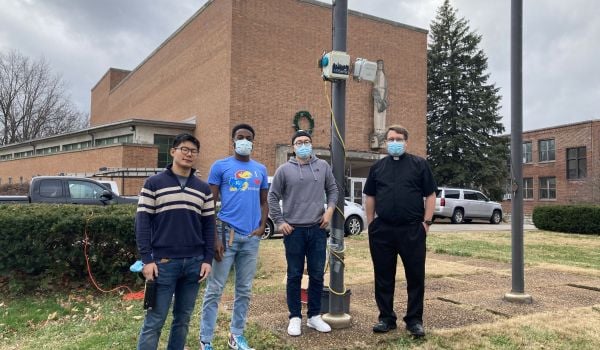Geoff Manaugh over at BLDG BLOG takes a look at Front Row Studio’s Farmadelphia project, “their now widely known proposal for the transformation of Philadelphia, in which that city’s vacant and abandoned lots are turned into a thriving agricultural zone – complete with crops grown for local consumption and soil remediation, and with an eye toward future tourism, including surreal petting zoos, hay rides, and even corn mazes.”
The project raises interesting questions – as cities across the country face the reality that growth may not be the future, should planned reclamation become a priority? The renderings are quite beautiful, but hint at the myriad of issues that may arise with large scale reclamation – such as chickens literally crossing the road. Nevertheless, the idea of urban farming has been gaining steam recently. Check out Greensgrow Farm to learn more about an urban farm in action.
Spain subsidizes home improvements to reduce environmental impact
From Treehugger: “On Monday, Prime Minister Jose Luis Rodriguez Zapatero pledged that his government would give out 1 billion euros (or $1.47 billion) in direct subsidies over a 4-year period – beginning in 2008 – enough to revamp about 500,000 homes. Moreover, it will also hand out 2 billion euros in credit every year to help people boost their home energy efficiency by 35 to 60% and will release 200 million euros to improve efficiency in public buildings in cities whose populations number more than 50,000 residents.”
Such green subsidies may be exactly what is needed for large scale environmental change. Powerful institutions such as Harvard are committed to the idea, with a green fund that provides “capital for high performance campus design, operations, maintenance and occupant behavior projects.” Apparently, the fund sees some pretty serious ROI by investing up front to improve efficiency and cost over the long term.
Neal Pearce of the Washington Post ponders if Amtrak’s time has finally come:
“America’s train advocates are mildly optimistic. And for some good reasons. Amtrak is reporting impressive ridership gains. Oil is pushing $100 a barrel, throwing a long shadow over affordability of travel on already congested highways. Airport delays hit an all-time high last summer. Global climate concerns are mounting.”
For years, polls have shown Americans strongly in favor of Amtrak subsidies that would build a viable national rail system. But only slowly have legislators — federal and state — shown an openness to system expansion. And the Bush administration has been hostile; it’s even tried to zero-fund Amtrak.
So here’s the irony: Amtrak is able to report it carried 25.8 million passengers in the last fiscal year — up 1.5 million from the year before. Ticket revenue rose 11 percent. Trains on the Northeast Corridor and other popular corridors are increasingly sold out.”
Having been a passenger on one of those sold-out, east coast trains this weekend, I would agree that it is time for the federal government to step up and provide funding for an efficient and viable mass transit system. Countries in Europe and Asia continue to develop systems that link expanding regions with high-speed trains. If we don’t act decisively, we’ll be left in the cold. New York’s Regional Plan Association is envisioning what the country might look like in 2050, and a high speed rail system is part of their vision. Check it out here .
IOC to Beijing: Improve air quality or face rescheduling
From the BBC: “The International Olympic Committee (IOC) will reschedule events at the 2008 Beijing Games if air pollution is a threat to athletes’ health. In October a United Nations report said pollution in the Chinese capital was more than three times the safe limit.”
“Beijing has already poured about $16bn into environmental programmes in an attempt to reduce pollution. Scores of factories have been dismantled or moved out of the city and thousands of high-polluting taxis and buses have been taken off the road. But with on-going construction and an estimated 1,000 new cars hitting the streets each day, the Beijing air has further deteriorated in quality.”
Keys to the city: how Philly Car Share was born
Philadelphia Magazine recently published a feature on Philly Car Share, the equivalent of Zipcar, a service available in New York, D.C., London, and Vancouver to name a few.
“In the old telling of the American story, the car is an inherent good. Ours is an awesomely big country … and what lets you experience that bigness is the car … and so the car is freedom, and freedom is America. Problem: In cities of 50,000 or more, where two out of three Americans live, the car is not an inherent good. The car eats real estate, degrades the air, cuts us off from the joys of public space — simple facts that haven’t stopped urban planners from designing cities around cars instead of people, or the government from misdirecting tax dollars. It subsidizes cars, not trains. It builds roads, not tracks. We don’t need more cars, but we get them anyway. Such is the power of that emotional bond, reinforced by advertising, cemented by lobbying: car/America, America/car.”
I suggest you read on, it’s quite an interesting article about how two entrepreneurs navigated their way through the sometimes sticky business and political landscape of Philadelphia to start this innovative company.
I know a few cities that could benefit from such a service – Baltimore for one. Post below if you think your favorite city should have a car share service.












